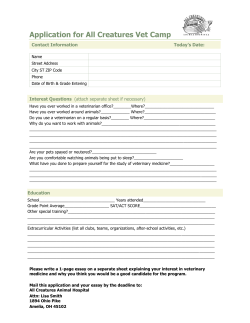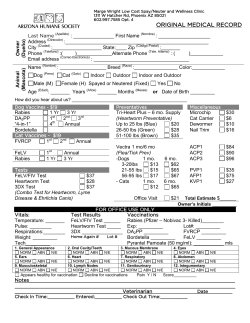
P S Steering
POLICY STATEMENT Steering October 2014 Purpose This policy statement clarifies the College’s interpretation of the activities that constitute steering between any person or group and a veterinarian or veterinary practice. Definitions Conflict of Interest: A conflict of interest is generally understood to be where the private interests, usually financial, of a person conflict with that person’s professional responsibilities. Steering: A prohibited activity whereby a person is systematically referred or directed to a particular veterinarian or veterinary practice by another individual or organization, and where the direction is made for a reason other than the genuine belief that the receiving veterinarian or practice is being recommended for specialized skill, knowledge or expertise; and has the effect of restricting a person’s choice of veterinarian based on criteria of importance to him/her. Strengthening the veterinary profession through quality practice and public accountability. Overview of Ontario Regulation 1093, Section 38 (Veterinarians Act) The steering prohibition ensures that a recommendation or referral to a particular veterinarian or practice is made for defensible reasons and will not produce a benefit to one or more parties (veterinarian, referrer, potential client) beyond the acquisition of a new client (by the veterinarian), a benefit beyond good will (for the referrer), and/or the delivery of quality services (to the client.) The intent of the steering prohibition is not to regulate competition amongst veterinarians. Section 38 of Ontario Regulation 1093 places the responsibility on the veterinarian to perform all measures necessary to ensure he/she is in compliance with the regulation, up to and including a refusal to provide service to any parties that appear to be involved in a steering system. Members of the public expect practitioners of a profession to be honest and to serve their best interests. When a veterinarian refers a client to another veterinarian with specialized knowledge or expertise, the client trusts that the referral has been made in the best interest of the animal, and that the referring veterinarian believes the specialist is the right individual to manage the case. The fact that the specialist is gaining a new client through the process is secondary to the reason for the referral, and there is no conflict of interest involved. Similarly, when a person recommends his/her veterinarian to another person based on sincere opinion alone, there is no conflict of interest for either party. When referrals are or could be perceived as being made primarily in order for one or both of the parties to receive a benefit tied to the referral then steering might be involved. When steering occurs, it could have a negative impact on the integrity of the profession. “Steering” is therefore a prohibited activity under section 38 of Ontario Regulation 1093. A Steering Relationship The test defining a steering relationship is whether the following four components are present: 1. there must be a “system” (i.e., a structured agreement or ongoing activity or pattern of behaviour); 2. the system must result in clients being directed to a particular veterinarian(s) or veterinary practice(s); 3. the veterinarian(s) must knowingly participate in the system in some way; and 4. there is either a) a conferral of some benefit to the referrer, or b) a restriction on which veterinarians may participate in the system (beyond reasonable restrictions such as location, specializations or scope of practice). Policy Statement Steering 2 A list of preferred providers is not considered steering unless the veterinarian pays a fee, over and above a fee for membership in an association, to be included on the list and/or the list is intended to preclude a client from obtaining veterinary services from their veterinarian of choice. Legislative Authority RRO 1990, O Reg 1093, s 45 (Veterinarians Act) College publications contain practice parameters and standards which should be considered by all Ontario veterinarians in the care of their patients and in the practice of the profession. College publications are developed in consultation with the profession and describe current professional expectations. It is important to note that these College publications may be used by the College or other bodies in determining whether appropriate standards of practice and professional responsibilities have been maintained. The College encourages you to refer to the website (www.cvo.org) to ensure you are referring to the most recent version of any document. Policy Statement Steering 3
© Copyright 2025


















